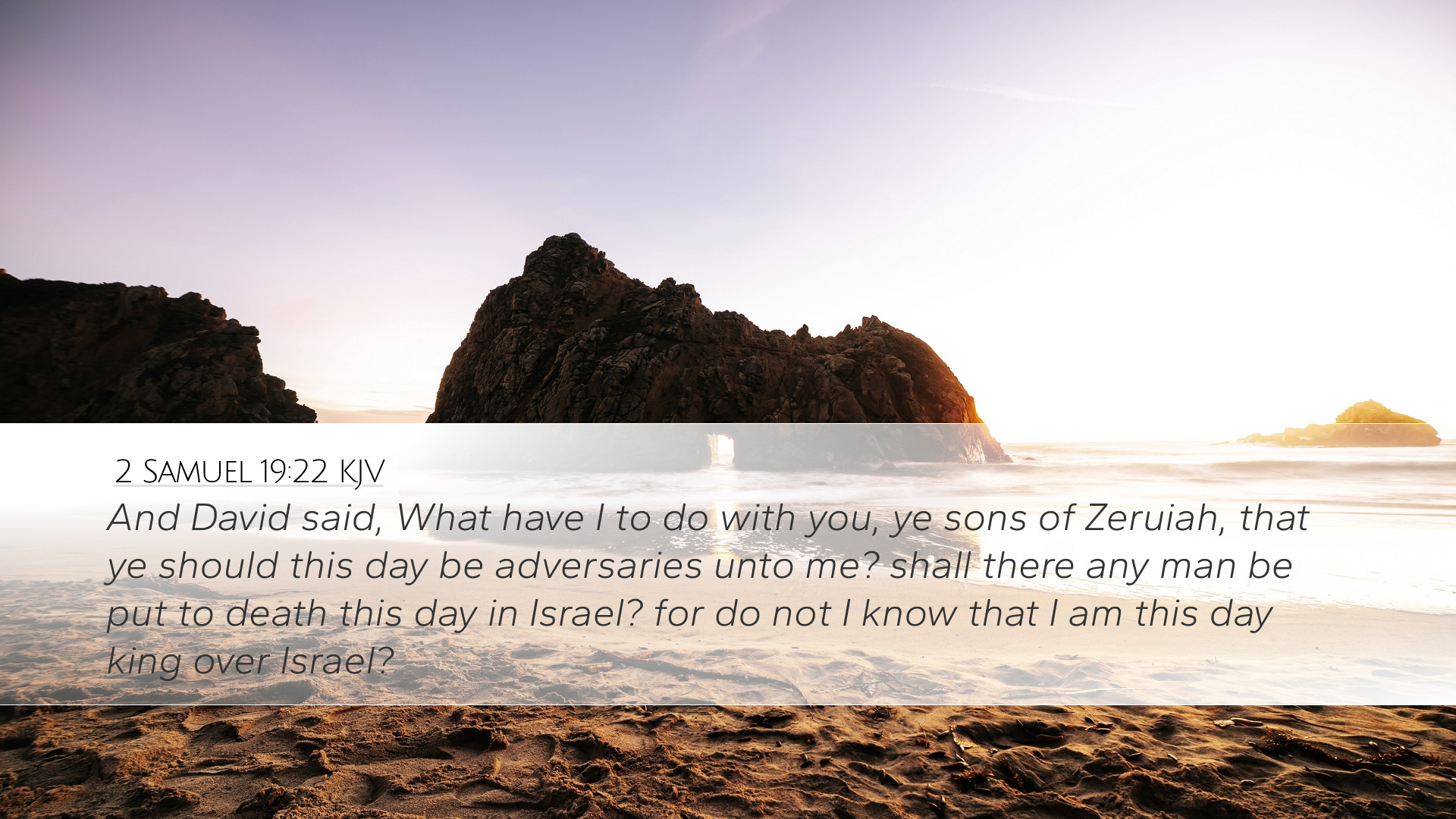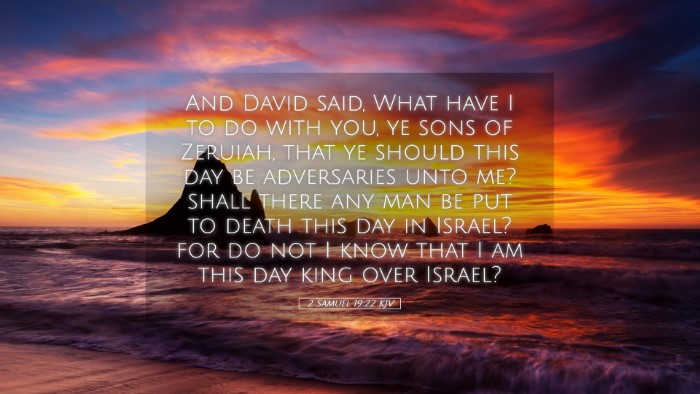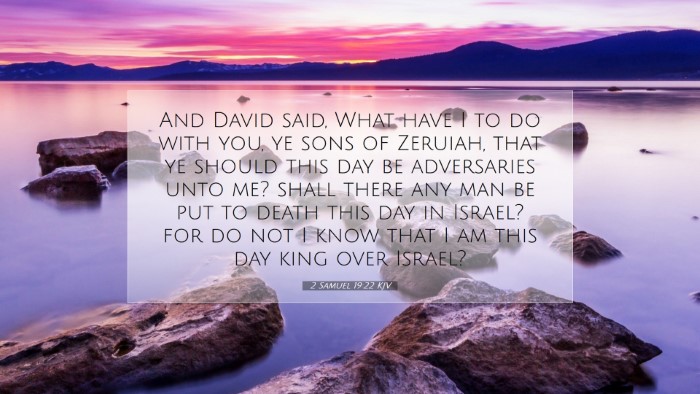Commentary on 2 Samuel 19:22
Bible Verse: "And David said, What have I to do with you, ye sons of Zeruiah, that ye should this day be adversaries unto me? shall there be any man put to death this day in Israel? for do not I know that I am this day king over Israel?" (2 Samuel 19:22 KJV)
Introduction
The context of 2 Samuel 19 revolves around David's return to Jerusalem after Absalom's rebellion and subsequent defeat. After a period of turmoil, David faced critical decisions regarding justice, mercy, and the nature of his leadership. This verse reflects a significant moment where David addresses the fierce loyalty and zealous actions of his own men, particularly the sons of Zeruiah, which leads to deep insights into the nature of leadership and reconciliation.
Exegesis of the Verse
In this verse, David raises an important rhetorical question that reflects his heart and intention as a leader. The sons of Zeruiah (Joab and his brothers) were known for their martial prowess as well as their passionate, sometimes reckless, loyalty. David’s inquiry, "What have I to do with you?" indicates a moment of distancing from their violent impulses. He challenges them, indicating that, contrary to their passions, he does not wish to enact further bloodshed, especially on such a day of restoration and grace.
Key Themes
- Leadership: David's approach shows a critical distinction between righteous leadership and mere authoritarian rule. His day as king should be characterized by unity rather than division.
- Mercy vs. Justice: David’s refusal to punish anyone reflects a commitment to mercy over vindictiveness. This indicates a depth of character that seeks to heal rather than harm.
- Restoration: The verse sets the stage for David's intent to unify and reinstate peace after a period of violence and division.
Commentaries from the Theologians
Matthew Henry
Henry emphasizes the importance of David's merciful spirit in this narrative. He draws attention to the nature of leadership: "Those in authority must stand against the rash and passionate impulses of their followers for the greater good." Henry interprets this act of restraint as emblematic of a wise ruler's duty to seek reconciliation rather than revenge, suggesting that supporters of a leader should not be quick to escalate tensions. David's reign, thus, is marked by a spirit of grace, setting a precedent for his future dealings and the way justice was administered in Israel.
Albert Barnes
Barnes explores the implications of David's dialogue with the sons of Zeruiah. He notes that David's kingship is not merely about authority, but about the heart of a king. He writes, "A true king wins the hearts of his people not through fear but through love and mercy." Barnes points out that David's choice to prioritize the unity of Israel over the wrath of his supporters reflects a profound understanding of the role of a leader in tumultuous times. It highlights an underlying theme — that leaders must grapple with the tension between justice and mercy, especially when confronting their own loyal warriors.
Adam Clarke
Clarke delves into the cultural and social ramifications of David's statement. He notes that David’s role as king required an adherence to moral principles derived from God’s law. Clarke states, "In moments of crisis, a wise leader must turn to the divine for guidance." David’s refusal to punish reflects a commitment to divine justice rather than human retribution. Clarke emphasizes the necessity for leaders to model grace amid potential chaos, which ultimately serves to stabilize and unify a community in disarray.
Theological Reflections
This verse presents essential theological reflections pertinent to Christian leadership today. Firstly, it invites a rich discourse on the nature of authority and its exercise within various leadership contexts — be they ecclesiastical, political, or communal. David’s response models grace as a foundational attribute of godly leadership, challenging leaders to prioritize restoration and healing over the impulse for retribution.
Applications for Modern Leaders
- The Role of Mercy: Leaders must continually evaluate their responses to conflict, seeking to embody mercy as a counter to the instinct for punishment.
- Unity over Division: The emphasis on restoring unity within any assembly or organization is essential. Leaders are called to foster an environment of reconciliation.
- Seeking Divine Guidance: Decisions should be made in consultation with scripture and divine principles, guiding leaders away from rash actions influenced by personal loyalties.
Conclusion
2 Samuel 19:22 challenges modern readers, especially leaders in the Church, to embrace a posture of mercy, reconciliation, and reflective leadership. As they navigate the complexities of guiding congregations, organizations, or communities through conflict, the principles illustrated by David become crucial. It is a call to balance authority with compassion, ensuring that every action taken aligns with the greater call to unity in Christ.
In sum, David’s declaration exemplifies a leadership model worthy of emulation, demonstrating that true power is found not in the wielding of authority but in the gentle administration of grace.


